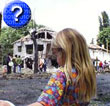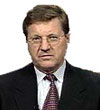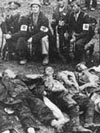 |
 |
 |
| Indeed
it was the United States Secretary of State, Madeline
Albright, who led a Western imposed peace settlement in
that ravaged country that called for the sharing of power
with the rebel leader, Foday Sankoh, the man chiefly
responsible for the carnage. This is the same Madeline
Albright who when asked if she thought the sanctions
against Iraq were worth the lives of so many Iraqi
children replied in the affirmative. |
 |
 |
 |
|
 |
|
| And
so it goes, the list is a long one. Obviously the Western
democratic leaders are selective about their human rights
concerns. There was no suggestion of intervention in Chechnya
another example of human rights violations on a scale that
made Kosovo look like a picnic. |
 |
 |
 |
| Canada’s
Foreign Minister, Lloyd Axworthy would in all likelihood
answer to this charge of inconsistency as he did in a speech
last February at the New York University School of Law by
saying, “for those who criticize humanitarian intervention
on the grounds that it is inconsistently employed, I would
ask: if the international community cannot intervene
everywhere, does that mean we must not intervene anywhere?” |
 |
 |
 |
| Surely
this is too convenient and facile an answer. If there is to be
any sense at all in the structure of international security
there must be some degree of consistency and criteria to
determine when intervention in a sovereign state is warranted.
What exactly are the new ground rules for humanitarian
intervention? These, to my knowledge, have never been spelled
out except in the vaguest of
terms. The human security agenda deals in abstractions
and generalities. It sounds great but so far has fallen far
short of becoming a realistic formula for international
action. |
 |
 |
 |
| In
contrast, we do know what the rules are now. The founders of
the United Nations established them. They demand Security
Council authority before armed intervention can be taken
against a sovereign state. If Security Council authority is
blocked by the veto power of one of the great powers then it
is still possible to go to the General Assembly where a
two-thirds vote would be sufficient to permit intervention. |
 |
 |
 |
| Mr.
Axworthy, our Foreign Minister has complained that the
Security Council does not always respond to the challenges
posed by the new human security threats. I would suggest if he
is referring to Kosovo then there might be more than arguable
grounds for believing the Security Council would have every
right to contest this intervention. |
 |
|
 |
 |
 |
| Nevertheless,
the point is that NATO didn’t bother even approaching the
Security Council before bombing Yugoslavia. Nor did our NATO
leaders choose to approach the General Assembly of the United
Nations for authorization. The bombing of Yugoslavia was an
illegal act, contrary to every precept of international law
and the Charter of the United Nations. Quite a part from all
the other serious implications of the NATO strike against
Yugoslavia the trampling on the United Nations Charter is
perhaps the most serious. |
 |
 |
 |
|
Having
totally ignored the United Nations Charter it is curious to
find that our NATO leaders place so much reverence on some of
the subsidiary organs of the UN. The International Criminal
Tribunals for the former Yugoslavia and Rwanda receive lavish
praise from NATO leaders. So far every attempt by
international lawyers to get the Tribunal in the Hague to
consider charges against NATO leaders for the most serious
crime on the UN books; namely waging war, has met with no
success. |
 |
 |
 |
| This
begs the question of who are the real war criminals. During my
period in Yugoslavia as the Canadian Ambassador I witnessed
how time and time again it was interference from the Western
powers that did little to bring a non-violent and diplomatic
solution to the problems of Yugoslavia. On the contrary,
Western involvement complicated an already complex problem and
ensured that a peaceful settlement among the several parties
became impossible. American and Western European policy driven
by selfish domestic issues contributed directly to the
bloodshed and violence that tore the Yugoslav Federation
apart. |
 |
 |
 |
| As
Yugoslavia began to experience the first signs of
disintegration the United States policy of indifference and
later ambiguity encouraged the extremists on all sides and
undermined the authority of the central government. I was in
Belgrade when US Secretary of State, James Baker assured the
Yugoslav Prime Minister, Anton Markovic, that if the Slovenes
attempted to break away from the Federation by illegal means
then the Yugoslav army could be used to prevent secession. A
few days later this is what happened but the United States
then quickly withdrew its support for unity. The West
abandoned the many thousands of Yugoslavs of different ethnic
or religious persuasion who believed in a united Yugoslavia.
The playing field was left to the extremists and those who
wished to separate. |

|
|
 |
 |
 |
| Later,
as many thousands of Bosnians marched for peace fearing the
inevitable blood bath of civil war, a peace settlement seemed
to have been reached through the skillful negotiations of the
Portuguese Foreign Minister, Jose Cutileiro. The so-called,
Lisbon Agreement, of March 1992 held out the last hope that
the three religious groups in Bosnia might live peacefully
together. It was not to be. The United States dispatched its
Ambassador from Belgrade to Sarajevo, who encouraged the
Muslim leader, Alija Izetbegovic to withdraw his signature
from the agreement he had signed along with his Serbian and
Croatian counterparts. This US intervention guaranteed civil
war in Bosnia and the death and displacement of thousands of
people. |
 |
 |
 |
| After
the fighting broke out in Bosnia it was the United States that
undermined every subsequent peace initiative that might have
brought an end to the killing. The Vance/Owen and later the
Owen/Stoltenberg peace plans were both subverted by the
Americans so that the fighting was prolonged. Moreover, it was
the United States that violated the arms embargo by providing
arms and training to the Bosnian Muslims and the Croats. It
appeared that the United States was determined to pursue a
policy that prevented a resolution of the conflict by other
than violent means. |
 |
 |
 |
| The
Americans were not alone. Germany’s determination to
reassert its dominance in the Balkans led it to encourage and
support Slovene and Croatian independence. Chancellor Kohl’s
insistence that Slovenia and Croatia be recognized as
independent states was the death sentence for Yugoslavia.
Sadly it was also the death sentence for many thousands of
Serbs and Croats. |
 |
 |
 |
|

Ustashi
terror
|
Given
the horrors experienced by the Serbian minority in Croatia
during the Ustashi terror of the Second World War it was a
certainty that without some guarantees of their civil and
human rights the Serbian minority would take up arms to
prevent being cut off from their Serbian brothers in Serbia
and Bosnia. Nevertheless, notwithstanding the West’s new
found obsession with human rights no Western leader gave a
moment’s consideration to the human rights of the Serbian
minority that at that time made up 12% of the population.
(
next page ) |
|

